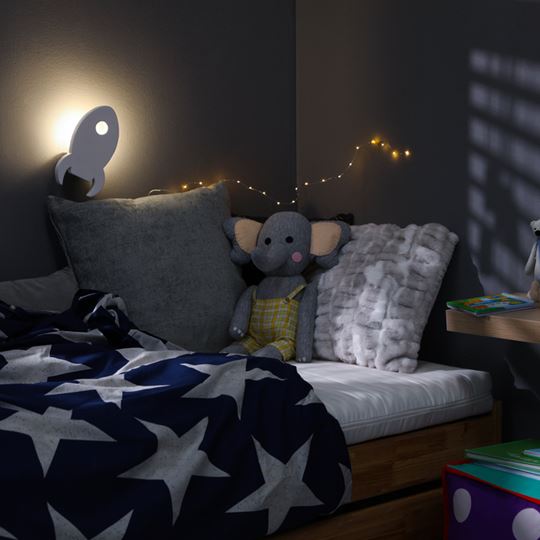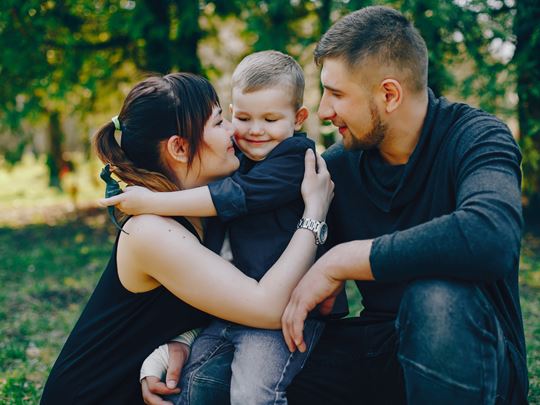1) Create a family book
A family book will be a great resource for your young person to learn more about you and your family. It’s a great creative project which the whole family can get involved in, and should include information about:
- You and your family members: who’s who and your hobbies and interests
- Your extended family
- Your family pets
- Your home
- Their bedroom
- Your neighbourhood and fun things to do in the area
- How your family likes to spend time together
Your family book can include photos, drawings and hand written welcome messages, making it a great way of involving your own children and helping them to prepare to foster.
Your family book can help to reassure them that you’re a warm, fun and friendly family, who will take care of them and make them feel at home. It’s a good idea to leave your family book in the young person’s room so that they can refer to it whenever they feel like it.

2) Prepare their bedroom
A cosy, neutral bedroom is usually the best option when a child first comes to live with you. A calm, soothing colour palette and a tidy space with room enough for their belongings and space to rest and play are a great starting point for really helping to make the room feel like their own space.
Remember, neutral doesn’t have to mean boring— a few age-appropriate home comforts which could appeal to all children, like soft toys, a selection of books or a night light— can help to make the space feel homely when a child first arrives.
You could later ask them if they’d like to help decorate the room— but don’t worry, this doesn’t have to be expensive. Allowing the child in your care to choose their own bedding, posters and décor is not only a fun bonding activity, but may also help your young person to feel more at home and regain some sense of control.
3) Always be ready with the basics
Referrals are not always planned in advance, and you may find that a young person arrives at your door with little time to prepare, especially if you’ve chosen to pursue emergency fostering.
It’s important to stay stocked up on the essentials, which include:
- Fresh bedding
- A fresh set of towels
- A new toothbrush
- Sanitary products
- Shower essentials like body wash, shampoo and conditioner
Many children who are brought into care will arrive at your home with very few possessions, so once you may also want to pop to your local supermarket to purchase some basics like underwear and pyjamas. Just be sure not to purchase lots of things specific to a young person until you’ve had confirmation from us that the child will definitely be coming to stay with you.
Once the child’s settled in to your home, it can be a really welcoming gesture to take them out and let them pick some of their own clothes, toys and other comforts.

4) Do a food shop
Your first few days with your young person will likely be busy as you help them to settle in, fill out the necessary paperwork, and check in with your supervising social worker. Because of this, it’s a great idea to pop to the shops to make sure you have everything you’ll need for your first week in advance, and perhaps top up your freezer with easily prepared meal options to ease some of the pressure.
It’s also a good idea to pick up a couple of cereal options so that kids have a choice of what they’ll be eating. While it may be tempting to stock up the fridge with healthy options, you may find that the child you’re taking care of isn’t used to some of the foods you might offer and would be more comfortable with foods they’re used to.Things like chicken nuggets, chips and spaghetti hoops tend to be a safe bet for most kids in the early stages of your time together. Developing healthy eating habits can be a goal to work towards together later.
You may also choose to provide your young person with some grab-and-go treats to choose from like fruit, chocolate bars or crisps. They may be tired and hungry from the journey, and a snack they enjoy and are familiar with can provide a little bit of comfort during what is undoubtedly a difficult time.
5) Small gestures make a big difference
When you receive a referral to take care of a child, it should include some information about the young person to help you offer them the best care possible. Your social worker can also work with the local authority to find out more information about their likes and dislikes, their favourite foods, and more.
If you find out that the child you’ll be looking after loves a certain cartoon series, you could welcome them to your home with a toy from the show, or a poster in their bedroom from their favourite video game. If their favourite food is pizza, you could make the extra effort to make them feel welcome by offering it to them as an option for their first meal with your family. These small gestures can go a long way to help them feel settled and safe, without overwhelming them.
Speak to your supervising social worker or the referrals officer if you have any specific questions about the young person you’ll be looking after.
Your next steps
We hope you’ve enjoyed reading through our tips on how to prepare for a foster child, and that you feel like you have everything you need. Remember, we’re here to support you every step of the way, so if you have any questions, please get in touch with your local team or supervising social worker.
Next in the series, we’ll be sharing advice on important things to do on your first day with your young person to help them settle in. You can also check out our previous blog post on how to support your own children when you start fostering.
Ready to start your fostering journey?
By phone
One of our team is available to talk to you over the phone to answer any of your fostering queries.
Enquire online
You can get in touch by filling out our online enquiry form with any queries that you may have.
Your local office
We have local teams covering most of England. Find your local office today.






